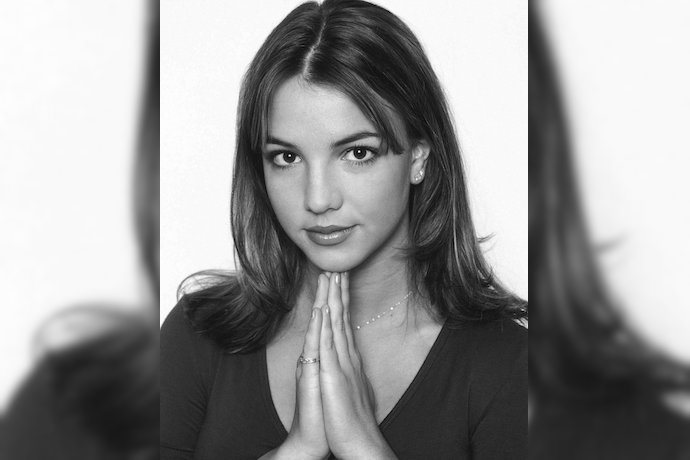Everyone knows Britney Spears. Her talent, popularity, and struggles with mental illness are ubiquitous. A widely celebrated artist dubbed “The Princess of Pop,” Spears has five No. 1 singles and six No. 1 albums. She’s sold 150 million records around the world. After a public episode of mental illness in 2008, Spears was assigned a conservator. Since 2008, she’s nonetheless conducted four world tours, recorded four albums, and performed 248 sold-out shows in Las Vegas. Today she’s worth more than $60 million.
While everyone knows about Spears, few know—and even fewer discuss—the role religion has played in her life. Like Katy Perry, who was once a Contemporary Christian Music artist, Spears has deep roots in white American evangelicalism. Born and raised in the Bible Belt and surrounded by conservative evangelical Protestants, Spears grew up Southern Baptist and spent her childhood performing in Baptist choirs. For her very first stage performance, when she was five years old, she sang “What Child Is This” at her kindergarten graduation.
Spears was actually a standard-bearer for evangelicalism, especially evangelical purity culture, about which numerous articles have been written. Along with other young, evangelical women pop stars like Jessica Simpson and Mandy Moore, Spears made purity a part of her brand, even while pushing sexual boundaries. Like many other evangelical women, Spears was forced into the Madonna/whore dichotomy; she had to be sexy enough for men to consume, but she was to remain chaste herself. As journalism professor Evelyn McDonnell has observes, “Selling Britney as a virgin…made her a non-participant in the sexual pleasure that was clearly a part of her appeal. From the very beginning of her career, she lacked agency.”
Furthermore, Refinery29’s Danielle Campoamor points out, “It was when Britney reclaimed her agency that her image began to crack.” Britney’s image cracked as she exerted agency because her childhood and early adult life were predicated on the idea that she didn’t belong to herself. Growing up Southern Baptist, she was surely taught 1 Corinthians 6:19, in which the Apostle Paul allegedly argued that spiritual slavery is good because “You are not your own.”
Evangelicals take this literally, believing that people are slaves to God and thus “our bodies do not belong to us.” Media studies professor Christopher R. Smit highlights how, “God’s proprietorship would have been theologically paramount in the young girl’s imagination… Always she was someone else’s, rarely her own person.”

From Spears’ 2007 album Blackout.
Like many evangelical children, Spears rebelled as she grew older—and often against religion. The artwork for her 2007 album Blackout, for example, includes images of Spears posing suggestively in a confessional booth with a priest. Whenever Spears rebelled, evangelicals were right there to attack her and demand she step back into line. “The common evangelical argument about Britney was that she had failed to live up to her potential as a soldier for the Lord,” writes Smit.
Spears’s story is something many evangelical and formerly evangelical women can relate to. Her story is, as youth pastor Kelly Edmiston points out, “paradigmatic for so many women who feel trapped by the controls of the society and church in which she inhabits.” Edmiston goes on: “Ever since we blamed Eve…for eating the forbidden fruit, we have been trying to control her; suspicious of her capacity to manage her own life.”
When you strip away all the layers of celebrity and money from Spears’s story, you end up with a story about a fight between Jamie, a domineering, evangelical father, and Britney, his independent, bipolar daughter. Control of one’s family is highly valued by evangelical fathers; this goes hand in hand with the patriarchy that’s so prevalent in evangelicalism. Yet so few journalists have addressed these religious layers to Spears’s story.
Evangelicalism breaks into Spears’s life from more than one angle. While several journalists have noted the role of Spears’s former business manager, Lou Taylor, in Spears’s conservatorship, Taylor deserves greater scrutiny. In Ronan Farrow and Jia Tolentino’s New Yorker piece on Spears’s conservatorship, for example, they include a single throwaway line about Taylor’s religious beliefs: “Jamie had become close to Lou Taylor, a business manager who shares the Spears family’s Christian faith and whose husband is a pastor at an evangelical church.”
Taylor deserves greater scrutiny because, as multiple journalists have reported, she appears to be “the mastermind behind the conservatorship.” In Spears’s mother Lynne’s book Through The Storm, she recounts how Taylor and Jamie planned for the conservatorship for weeks before Spears’s public breakdown. Lynne stated that they fasted and prayed to get the power to “regain charge of our child.” Taylor financially benefited directly from the conservatorship; when Spears’s father Jamie became Spears’s conservator, he appointed Taylor as manager for his daughter’s entire estate.
Taylor is the CEO of Tri Star Sports & Entertainment Group, one of the industry’s top management firms. The firm was featured in a 2017 Variety article, which noted, “Taylor is doing a whole lot right,” pointing to her management of Britney Spears as proof. It highlighted how “Taylor is probably most proud of her efforts to help women in the industry. ‘I’ve [a] huge heart to help and protect women,’ says Taylor.”
In fact, Taylor has allegedly tried to place multiple young women under conservatorships, stripping them of their rights to bodily and intellectual autonomy. Taylor was accused in 2010 by Michael Lohan of suggesting that he put his daughter Lindsay Lohan under a conservatorship, and musician Courtney Love has similarly claimed in 2020 that Taylor tried to do the same thing with her following Kurt Cobain’s death.
But Taylor’s “heart to help women” and conservatorships would not be contradictory in her mind. Taylor is an evangelical. Her husband, Rob Taylor, is the Senior Pastor of Calvary Chapel Brentwood in Tennessee. In addition to opposing marriage equality the church also believes in Complementarianism, a version of Christian Patriarchy that advocates for the submission of women and children to men and believes only men should be in positions of leadership in faith communities.
The Calvary Chapel network consists of almost 1,800 non-denominational evangelical churches around the world. It was founded by pastor Chuck Smith in 1965 in Costa Mesa, California and grew out of the Jesus Movement of the 60s and 70s. “Today,” says Carly Fox of Calvary Chapel Watch, “the vast majority of Calvary Chapels are far-right, authoritarian, evangelical churches that embrace white supremacist thinking, Christian Nationalism, queerphobia, and male supremacy.” They operate under what Smith called the “Moses Model,” whereby a church is governed by a senior pastor who is accountable only to God.
Spears’s story is the perfect example of the absolute power conservatorships grant to conservators entrenching the authoritarian, hierarchical family model often seen within evangelical faith communities. Independently, these systems both grant unchecked power over vulnerable populations, but together they have both legal and social sanction.
To get a more nuanced and personal perspective on the role religion has played in Spears’s life and conservatorship, I spoke with Bethany Grace, who, like me, was raised in the evangelical homeschooling movement, and who is (full disclosure) a friend. Grace wrote on social media that Spears’s conservatorship is “evangelicals’ dream of what to do with all of us backslidden daughters.” When I asked her to expand on her comment she told me, “A conservatorship for a functioning adult just seems like a logical extension of a belief system that gives unparalleled authority to fathers.”
Grace continued:
“Evangelicalism is a patriarchal system with people so convinced they ‘know better’ or are ‘saving someone’ that they are willing to override a person’s autonomy. Our culture already does this to children; evangelicals do it on another level though… It’s based on an idea of complete parental ownership of children.”
In many evangelical circles, especially evangelical homeschooling circles, parental rights absolutism thrives. According to parental rights absolutists, children do not have legal rights until adulthood, and thus parents have absolute power over their children. The government and the church should stay out of the home. This is the concept of “sphere sovereignty,” popularized by Abraham Kuyper and later embraced by R.J. Rushdoony. Some evangelicals even argue that adult women should stay home serving their fathers until marriage.
While most evangelical parents don’t force their adult children into conservatorships, many do force their juvenile children through conversion therapy, “troubled teen” camps, worldview institutes, nouthetic counseling, homeschooling—anything they can do to control their children. The extremes evangelical parents will go to in order to forcefully mold their children seamlessly complements the extreme power granted to conservators. “Evangelicals are so convinced that they have the absolute truth,” Bethany Grace argues, “that denying a child’s agency (even a grown child’s) or violating their bodily autonomy becomes easy for them to justify.”
Spears has never identified as an #exvangelical and #FreeBritney is not about religion. But she is a former evangelical who has pushed against her controlling family, who has suffered immensely at the hands of evangelicals, and who is treading new spiritual paths (Kabbalah, Catholicism) to heal. You can’t get much more #exvangelical than that.





